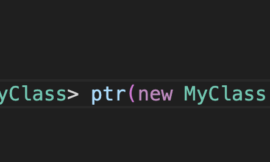Move Semantics in C++ – Efficient Resource Transfer
Move semantics, introduced in C++11, revolutionized resource management by allowing the transfer (rather than duplication) of resources like dynamically allocated memory, file handles, and sockets. This feature enables significant performance gains in modern C++ applications by eliminating unnecessary copies.
In this article, we’ll dive deep into:
- What move semantics are
- Why they’re useful
- How to implement them effectively using move constructors and move assignment operators
What are Move Semantics?
Before C++11, object transfers used copy semantics, meaning a full copy of an object’s contents was made during assignment or function calls. For objects managing heap memory or system resources, this could be expensive and inefficient.
Move semantics solve this by allowing ownership of resources to be transferred from one object to another — without expensive copying. This is especially helpful when dealing with temporary objects that are about to be destroyed and whose resources can be “recycled.”
Understanding Rvalue References
To implement move semantics, C++11 introduced a new type of reference called an rvalue reference, denoted as T&&. This reference type binds to temporaries (rvalues) and allows you to safely alter them since they are not going to be used elsewhere.
int a = 5;
int&& r = 10; // r is an rvalue reference
The Move Constructor and Move Assignment Operator
Move Constructor: A move constructor is invoked when a new object is initialized using an rvalue. It steals the resource of the temporary object, leaving it in a safe but unspecified state.
class Buffer {
int* data;
size_t size;
public:
// Constructor
Buffer(size_t s) : data(new int[s]), size(s) {}
// Move Constructor
Buffer(Buffer&& other) noexcept
: data(other.data), size(other.size) {
other.data = nullptr;
other.size = 0;
}
// Destructor
~Buffer() {
delete[] data;
}
};
Move Assignment Operator: The move assignment operator is invoked when an existing object is assigned an rvalue. It typically:
- Releases any current resource.
- Steals the resource from the source.
- Nullifies the source.
Buffer& operator=(Buffer&& other) noexcept {
if (this != &other) {
delete[] data; // Free existing resource
data = other.data; // Transfer ownership
size = other.size;
other.data = nullptr;
other.size = 0;
}
return *this;
}
Complete Source code:
#include <iostream>
#include <utility>
class Buffer {
int* data;
size_t size;
public:
Buffer(size_t s) : data(new int[s]), size(s) {
std::cout << "Constructed\n";
}
// Move Constructor
Buffer(Buffer&& other) noexcept
: data(other.data), size(other.size) {
other.data = nullptr;
other.size = 0;
std::cout << "Moved Constructor\n";
}
// Move Assignment Operator
Buffer& operator=(Buffer&& other) noexcept {
if (this != &other) {
delete[] data;
data = other.data;
size = other.size;
other.data = nullptr;
other.size = 0;
std::cout << "Moved Assignment\n";
}
return *this;
}
~Buffer() {
delete[] data;
std::cout << "Destroyed\n";
}
};
int main() {
Buffer b1(10);
Buffer b2 = std::move(b1); // Move constructor
Buffer b3(5);
b3 = std::move(b2); // Move assignment
}
Benefits of Move Semantics
- Performance Optimization: By transferring resources instead of copying them, move semantics can significantly reduce the overhead, especially for large objects.
- Resource Management: It simplifies the management of resources such as dynamically allocated memory, file handles, and sockets.
- Enabling Modern C++ Features: Move semantics are essential for the functionality of many modern C++ features, including the Standard Library containers which can now efficiently handle objects of types that are movable but not copyable.


